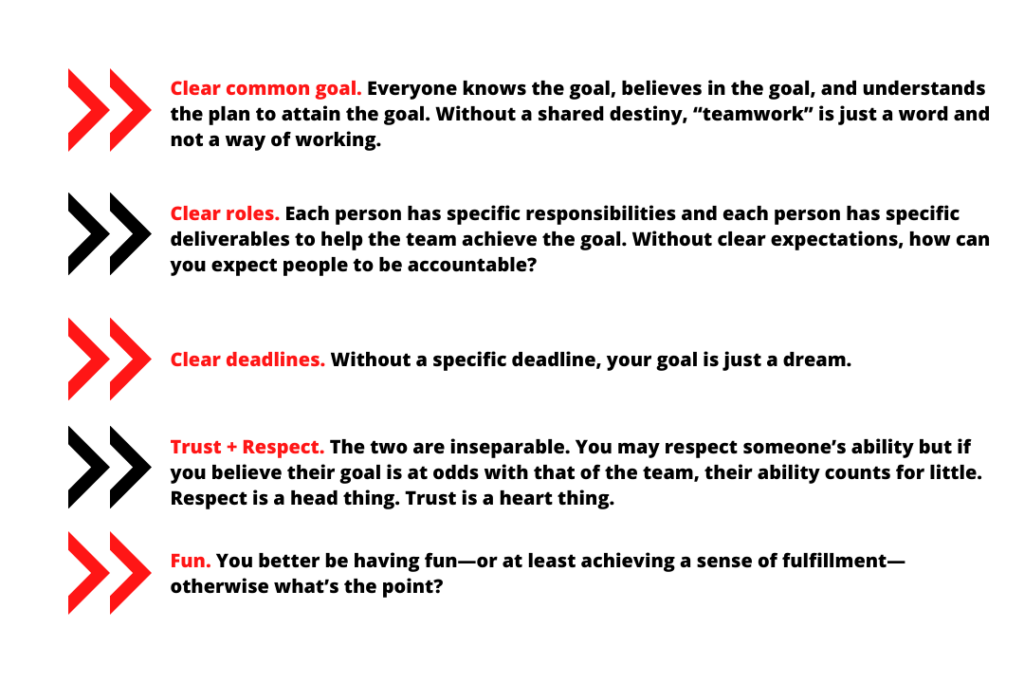
The 5 Characteristics of High-Performing Teams
Published in ProductivityWhat causes some teams to achieve remarkable results and others to flounder?
When I’m invited to speak to groups of business leaders on the topic of accountability, I begin by asking for two volunteers to share the best work team experience they’ve ever had.
The reason for my request is simple: Accountability on high-performing teams is high, and I want leaders to have a crystal-clear view of what high performance looks, sounds and feels like-and then compare it to the current performance they’re experiencing in their organization.
I’ll ask the volunteers to share three or four words that characterize the attributes of their high-performing team.
Three interesting things happen when the two volunteers share their experience.
First, I’m struck by the similarity of the experiences shared by the two volunteers. Wherever I go, I find the situations being described are almost always extremely difficult challenges in high-stakes situations. That challenging situation-and the fulfillment that comes from overcoming adversity to achieve a stated objective-contributes to the power of the memory, and it demonstrates the critical nature of accountability. Sometimes it could be because of a lack of adequate resources for task management. It is especially seen in the marketing field where different teams are required to collaborate on different projects.
What’s your experience as part of a high-performing team?
Second, there’s typically some overlap between the characteristics of a high-performing team described by the two volunteers. After they share the characteristics of their high-performing team, I share my list.
In my role as coach, consultant and confidante to hundreds of leaders and their teams, I’ve worked with lots of high-performing teams as well as my share of people who are supposed to be working as a team but who are struggling to perform consistently at a high level.
Here are the 5 characteristics of a high-performing team:

You’ve obviously noticed the first three characteristics share the word “clear.”
Clarity creates confidence.
Accountability is an uphill grind when clarity is absent. Lack of accountability occurs when:
Somewhere
somehow
in some ways
something
isn’t clear
to someone.
Peer-to-peer accountability is the most powerful form of accountability-provided you’ve got the right peers. When you’re a member of a team where the five characteristics are present, underperformance is addressed initially with curiosity and care-not judgment and retribution. But make no mistake: those who are in the process of aligning teams and transforming the members into high-performing achievers will possibly not tolerate people unable or unwilling to pull their weight.
Where can greater clarity around these five characteristics improve your team’s performance?
The third interesting thing that happens is when I ask for a show of hands among those in the room who considered their existing team followed by asking for a show of hands among those who considered a team from the past. There’s always a split-it’s usually about 50-50.
Which high-performing group are you thinking about? One from the past…or the present?
Great Coaches = Great Teams = Great Results
Accountability is a powerful force, yet it’s one of the most misunderstood and misapplied concepts in business and in life.
Accountability is more about coaching than scolding.
If you’re a leader you’re a coach.
Since football season is now in full swing, enjoy these quotes from some of America’s best coaches:
“A coach is someone who tells you what you don’t want to hear, who has you see what you don’t want to see, so you can be who you have always known you could be.”
~ Tom Landry
“You can easily separate ‘team guys’ from ‘me guys’ by how they accept coaching. The guys that accept it are about winning.”
~ Bill Parcells
“The secret to success is good leadership, and good leadership is all about making the lives of your team members or workers better.”
~ Tony Dungy
“Individual commitment to a group effort-that is what makes a team work, a company work, a society work, a civilization work.”
~ Vince Lombardi
“The secret is to work less as individuals and more as a team. As a coach, I play not my eleven best, but my best eleven.”
~ Knute Rockne
“Coaches have to watch for what they don’t want to see and listen to what they don’t want to hear.”
~ John Madden
“Talent determines what you can do. Motivation determines how much you are willing to do. Attitude determines how well you do it.”
~ Lou Holtz
“There are two pains in life. There is the pain of discipline and the pain of disappointment. If you can handle the pain of discipline, then you’ll never have to deal with the pain of disappointment.”
~ Nick Saban
“I don’t count on the boy who waits till October, when it’s cool and fun, then decides he wants to play.”
~ Darrell Royal
After USC lost 51-0 to Notre Dame, coach John McKay’s post-game message to his team was brief: “All those who need showers, take them.”
Which of the five characteristics will you focus on to raise your team’s performance?
Ready to reset?
Attend my free Accountability webinar: I Did It! to set and achieve your 2021 goals.
- February 17th from 11 AM – 12:30 PM Central Time
- My free webinar will help you:
– Sharpen your personal goals
– Improve time management
– Tackle tough work-related issues
– Support remote workers
Learn More
To dive even deeper into the topic of accountability, I invite you to purchase a copy of my bestselling book, “Accountability: The Key to Driving a High-Performance Culture.”
Become a better leader.
Download my three free e-books.
Free Tips
Sign up to receive free tips on business, leadership, and life.
Get My Latest Book
HOW LEADERS DECIDE
History has much to offer today’s current and aspiring leaders.
Business schools teach case studies. Hollywood blockbusters are inspired by true events.
Exceptional leaders are students of history. Decision-making comes with the territory.



